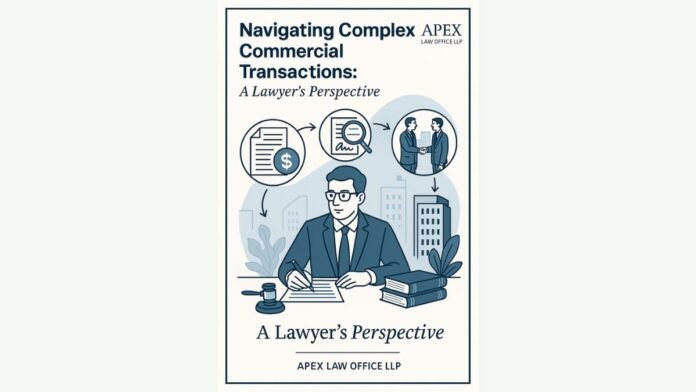Navigate complex commercial transactions confidently with expert legal strategies tailored for today’s dynamic business environment. Our article reveals how seasoned lawyers prevent costly mistakes and secure your interests in every deal. Moreover, we explain how to assess parties, draft airtight contracts, and handle negotiations effectively. In addition, you’ll learn how to ensure full compliance with tax and regulatory laws. Lawyers also monitor post-transaction obligations, which helps avoid future disputes and financial risks. For example, we guide you in managing performance milestones and sending timely legal notices when needed. Furthermore, our checklist helps you stay ahead during every transaction phase. Each step is explained in simple terms so business owners can make informed decisions.
As a result, you’ll protect your business, reduce legal exposure, and achieve smoother commercial outcomes. Whether you’re a startup or an enterprise, legal clarity is essential. Read now to transform complex deals into successful business opportunities with professional legal support.
Navigating Complex Commercial Transactions: A Lawyer’s Perspective – Apex Law Office LLP
Introduction
In today’s fast-paced business world, commercial transactions are not only frequent but often extremely intricate. These transactions involve high-value assets, multiple parties, and varied legal implications. At Apex Law Office LLP, we help clients successfully navigate these complexities with expert legal insight. This article explores how lawyers manage complex commercial transactions effectively, offering a practical and simplified look at the process.

Understand the Foundations of Complex Commercial Transactions Before You Begin
Before engaging in any transaction, it’s essential to understand what makes it complex. Unlike simple contracts, commercial transactions often involve multiple layers of legal obligations. These may include cross-border laws, financial compliance, stakeholder interests, and regulatory issues.
Evaluate Each Party’s Legal and Financial Position First
Knowing the parties involved is the cornerstone of a secure transaction. A lawyer investigates whether each party has the legal standing and financial strength to fulfill their obligations.
Review all business licenses and registrations properly
A company’s legal status is crucial. Lawyers begin by ensuring each party:
- Has a valid registration.
- Holds all required government licenses.
- Is legally authorized to transact.
This protects clients from entering agreements with shell companies or those under legal scrutiny.
Check for any outstanding litigations or disputes
Due diligence reveals:
- Pending lawsuits.
- Past fraud cases.
- Insolvency or liquidation proceedings.
These red flags can stall or void a commercial deal, and hence need legal intervention early on.
Verify financial health through audited statements
Lawyers coordinate with accountants to assess:
- Cash flow stability.
- Debt-to-equity ratio.
- Asset liquidity.
If a party is financially unstable, lawyers advise clients either to back out or demand guarantees.
List key decision-makers and verify signatory authority
Legal teams must confirm:
- Who is authorized to sign contracts?
- Are board approvals or shareholder resolutions needed?
Mistakes here can render a deal unenforceable, and cause serious legal setbacks.
Draft Clear, Detailed Contracts with Preventive Legal Strategies
When multiple interests are at stake, a well-drafted contract becomes the foundation of a successful commercial deal. Lawyers don’t just draft contracts—they foresee risks and eliminate ambiguities.
Contracts must outline what each party is supposed to do. This prevents disputes down the line. Transition phrases like “in addition”, “for example”, and “as a result” enhance clarity.
Outline business purpose and scope with measurable results
Every agreement should mention:
- Specific deliverables.
- Deadlines.
- Conditions precedent and subsequent.
This removes confusion on what counts as “performance” or “default.”
Mention detailed payment terms and methods
Legal professionals always ensure contracts cover:
- Advance and milestone payments.
- Penalties for delay.
- Interest on late payments.
Clarity here ensures smoother financial planning for all sides.
List out representations and warranties accurately
Lawyers define what each party promises, such as:
- Ownership of assets.
- Legal compliance.
- Absence of encumbrances.
If a warranty turns out false, the affected party has a strong claim for compensation.
Use well-drafted indemnity and liability clauses
Indemnity clauses must be:
- Clear about what is covered.
- Inclusive of legal costs.
- Reasonably capped for liability.
Without them, clients can suffer avoidable financial losses.
Negotiate Actively to Align Interests and Avoid Litigation
Lawyers play a proactive role in negotiation. They don’t just “approve” deals—they shape them. Strong negotiation ensures all sides benefit, reducing the chances of future conflict.
Break down each clause during negotiation sessions
Legal professionals explain:
- What every term means.
- How it impacts the client’s rights.
- Whether it’s industry standard or risky.
This transparency builds trust and leads to better decision-making.
Insist on mutuality in critical provisions
Terms like:
- Confidentiality.
- Non-compete.
- Termination rights.
Must apply equally to both sides. This mutual fairness discourages future disputes and shows good faith.
Propose alternative dispute resolution options
Instead of heading straight to court, lawyers insert:
- Arbitration clauses.
- Mediation requirements.
- Neutral venue choices.
These reduce time, cost, and business disruption when disputes arise.
Assess and negotiate exit clauses properly
Every agreement should say:
- When and how it can be terminated.
- The consequences of early exit.
- The process for asset return or dues recovery.
Lawyers balance legal protection with commercial flexibility here.
Ensure Compliance with Regulatory and Tax Obligations
Every complex transaction must pass legal scrutiny. Whether it’s a real estate acquisition or a multi-party joint venture, non-compliance can derail the deal completely.
Apply local and international compliance laws properly
Lawyers verify:
- FEMA, RBI, SEBI, or FDI norms (for international deals).
- Labour and employment laws (if employee transfer is involved).
- Land and real estate regulations (for property-based deals).
These laws often overlap, and missing one can lead to penalties or cancellation.
Evaluate tax impact and suggest optimal structures
Tax lawyers work closely with chartered accountants to:
- Minimize GST, income tax, or capital gains exposure.
- Structure share transfers and asset swaps legally.
- Avoid retrospective tax liabilities.
Clients benefit from smoother cash flow and fewer post-deal surprises.
Ensure proper government approvals and filings
Many deals need:
- Registrar of Companies filings.
- Stamp duty and registration.
- Sector-specific NOCs.
Lawyers coordinate this entire process, reducing client effort and avoiding non-compliance.
Draft post-deal compliance checklist in advance
Even after signing, legal obligations continue. Lawyers create compliance calendars for:
- License renewals.
- Tax returns.
- Employee transfer notices.
This structured approach builds trust with stakeholders and regulators alike.
Monitor Post-Transaction Obligations to Prevent Future Disputes
The lawyer’s job doesn’t end with signing the contract. Post-transaction monitoring ensures that both parties do what they promised—and if not, action is taken quickly.
Track performance milestones through legal dashboards
Lawyers create simple dashboards for clients showing:
- Completed milestones.
- Payment timelines.
- Delayed obligations.
This makes it easy for non-lawyers to understand progress and take action.
Send legal notices for delayed or failed obligations
If a party defaults, lawyers:
- Send legal reminders.
- Negotiate compliance extensions.
- Initiate formal breach notices.
These actions preserve the client’s right to future claims or penalties.
Handle breach of contract without emotional escalation
Lawyers approach breach situations:
- With professionalism.
- By referring to the contract terms.
- Without letting it become personal.
This keeps relationships intact when possible, or ends them smoothly when not.
Facilitate amendments or restructuring if business needs change
Sometimes, contracts need to evolve. Lawyers:
- Amend clauses without restarting the whole contract.
- Ensure new terms are valid and enforceable.
- File necessary updates with regulatory bodies.
This adaptability helps businesses stay legally protected while growing.
Conclusion: Lawyers Are Strategic Partners in Commercial Success
At Apex Law Office LLP, we don’t just handle paperwork—we help clients grow with legal confidence. Every commercial transaction is an opportunity, but only if approached with caution, planning, and legal skill. Our team specializes in simplifying complexities, from deal structuring to post-closing compliance.
Summary Checklist for Clients Entering a Commercial Transaction
Here’s a simple checklist lawyers at Apex Law Office LLP provide to all clients:
- ✅ Conduct party due diligence.
- ✅ Review and verify all contracts.
- ✅ Negotiate and insert protective clauses.
- ✅ Get all necessary licenses and approvals.
- ✅ Structure tax and payment terms efficiently.
- ✅ Maintain a compliance calendar post-signing.
- ✅ Seek legal guidance when performance issues arise.
Read More

